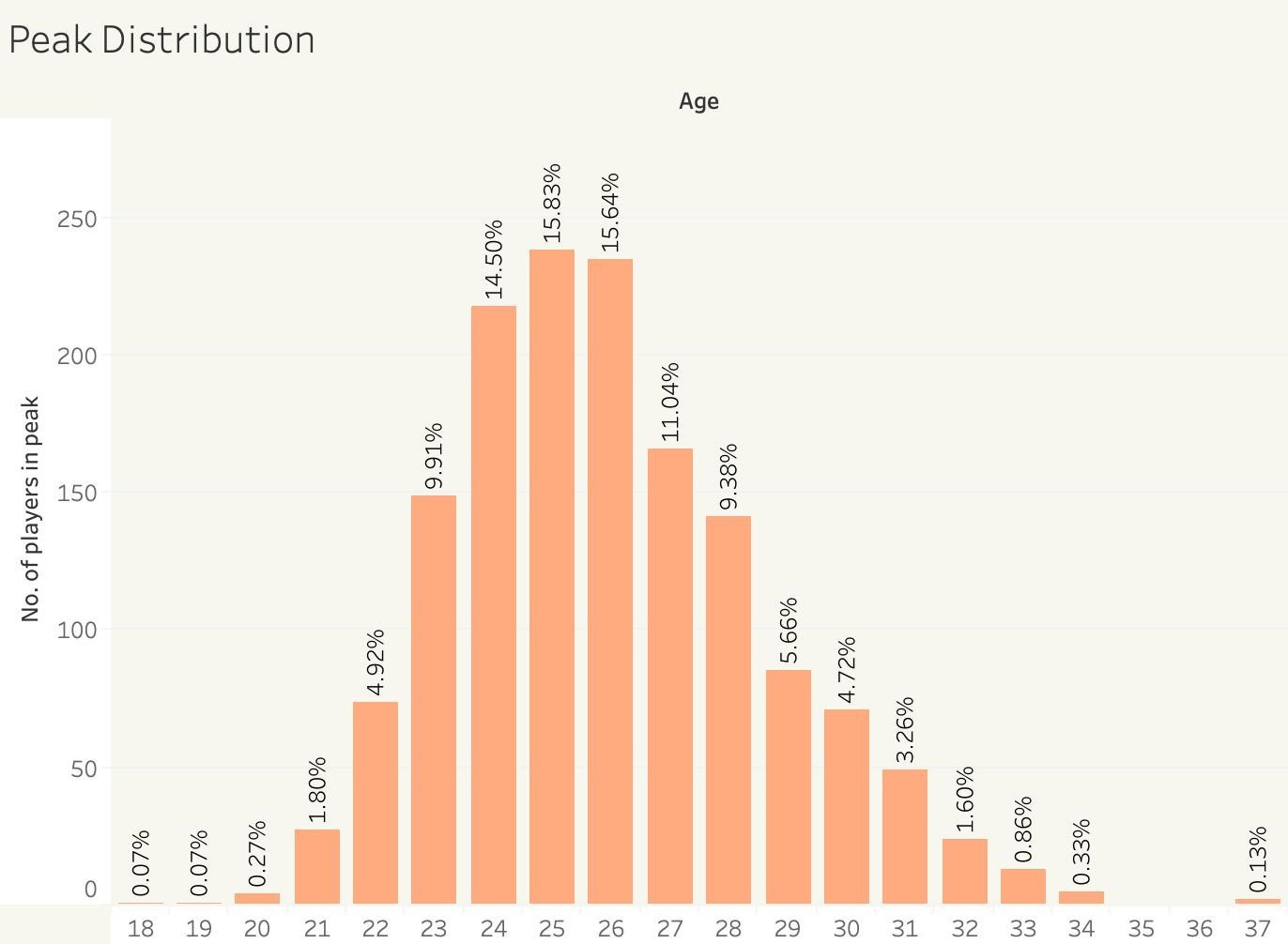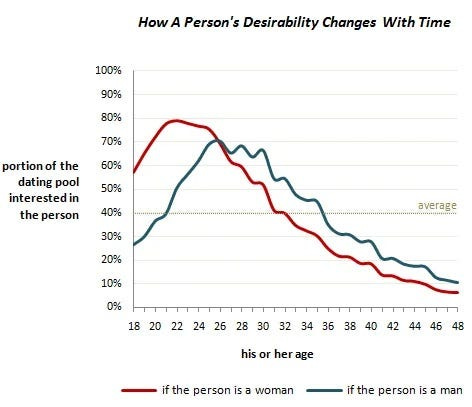Age-related changes can be categorized into growth, accumulation, and decay. Growth stops after puberty, accumulation happens between puberty and retirement, and decay is lifelong. Based on this simple theory, age-related changes in traits can be predicted easily; accumulative traits like income peak in the 40s, while basic traits like reaction time peak between 20 and 251. People’s life trajectories also become more predictable as they get older because they have more past behaviour to analyze.
Most humans are aware that age matters a lot, at least on an implicit level, and society adjusts accordingly. Romantic partners assortatively mate for age more than any other trait and it’s understood that past an age people aren’t supposed to do certain things; I’ve heard Peter Thiel exhibits little interest in founders above the age of 352.
Many people are anxious about ageing or feel insecure about being too old. This is irrational, as there isn’t very much people can do about ageing. Exercise, avoiding drugs, looksmaxxing, sleeping normally, and eating properly can hold back decay, but that only solves half of the problem: a 45 year old woman who looks 30 will not be treated like a 30 year old woman.
Because of this, I don’t think age anxiety is about ageing. It’s caused by not being able to leverage the positive aspects of ageing, being worried about missing out on developmental milestones or opportunities, and discovering what you were meant to become. The solution is not pursuing immortality, but doing things and coming to terms with yourself. Zoomers aren’t age anxious because they are getting older faster than previous generations, but because they are lagging in terms of action and development.
Relativity of ageing
Although NBA players peak at an average age of 26, the exact age at which individual players peak varies:
This is also true for scientific achievement:

Beyond the peaks of individual traits varying by person, the peak of people’s value varies far beyond that. The fact that the average man peaks at 30 doesn’t mean all of them, or even most of them will do so at that age. People in prison at the age of 30 definitely are not peaking.
Two guys with identical trajectories in terms of romantic relationships, income, health, and happiness might feel like they peaked at different ages because of differences in preferences: perhaps one of them preferred being active and desirable when they were 25, while the other preferred being 50 because he earned more at that age.
Nevertheless, “wait until you turn 35, life/dating gets better” manosphere advice is awful for everybody, regardless of their sex or trajectory in life. The men who worsen with age need to date early and the men who get better with age need to be doing things and not listen to old, washed up men on the internet. “Life ends at 22” is at least true for some people.
Can people just do things?
No. Age barriers are a thing — good luck getting into the NBA at the age of 30 or starting a serious relationship for the first time at the age of 40.
But thinking about whether it’s possible to start doing a given thing at the age of x is usually the wrong frame. One should do if they can. The fact that Aubrey de Grey became the #1 longevity researcher after getting into the field at 35 or Dennis Rodman became a great basketball player after coming into the NBA at 25 is proof that people can do things at most ages if they are willing and able. It’s the exception to the rule that exceptions prove the rule.
Most extremely successful entrepreneurs and game developers started when they were young and found success soon after starting. Many even based their projects on ideas they had when they were younger. But starting young is not the main reason they were successful, it’s that the talents and personalities of adults tend to change slowly after the age of 20, so people with the capability to great things were often able to do them at young ages.
Beyond developmental anxiety, I often find that people often have exaggerated ideas of how much people’s bodies decay. For reference:
The difference in reaction time between a 23 year old and 33 year old is 4ms: 258ms for 23 year olds and 263ms for 33 year olds. 0.08 standard deviations.
People in their 20s and 30s have more or less the same measured IQs.
50% of men have (at least some) erectile dysfunction when they are 50 (pretty brutal, but remember that most of these men have wives that are either old or fat).
20 and 40 year old men are about equally strong.
Human mortality doesn’t spike until about 50 years of age:

from here
Peak age of gamers: 22, based on my time watching games. It’s also the average age for most players.
Peak age of reaction speed: 20-25
Peak age of g: complicated by the fact that the Flynn effect biases the test scores of recent cohort upwards, which makes young people look smarter than they really are. Within longitudinal samples the decrease is not as stark, though the rate of change could be biased by attrition. Generally I’m inclined to believe that g itself peaks very early, perhaps as soon as children finish puberty, but that IQ test scores increase due to accumulated knowledge.
Peak age of attractiveness (for women): early 20s according to Dataclysm.
Peak age of attractiveness (for men): mid 20s according to myself and the chart.
Peak age of physical strength: 30 or so
Peak age of sexual function: ED diagnosis seems to increase linearly with age; I would guess the peak happens after puberty.
Peak age of earnings: 40 for women, 50 for men
In terms of personality, I think that people get less extraverted, neurotic, open minded with age; and more conscientious and agreeable as they age. Most studies seem to support these anecdotes [1] [2].
I think a hard cutoff (not sure if this is what he uses) is a little harsh, but skepticism of founders past the age of 35 is not unwarranted.






Phenomenal data driven post. You should write more about these normal / day-to-day topics.
I also suspect that ED rates are being inflated by men who simply aren't attracted to their wives anymore, but don't want to explain this. The real erectile dysfunction is the men who ARE getting erect thinking about postmenopausal women, if you think about it. In recent years, ED has been normalized even among young people. People talk openly about "sex mints" and "honey packs", things that would have been a subject of humiliation 10 years ago. It could be hypergamy, or it could just be that both men and women are getting less attractive (fatter, older).